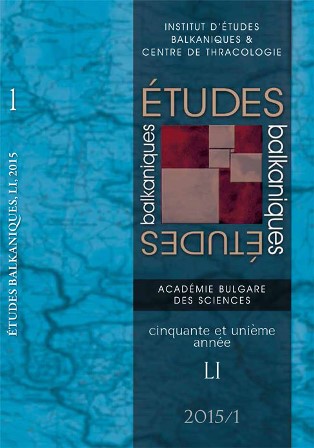THE ‘PEASANT’ BULGAR VS. THE ‘BOURGEOIS’ GREEK: SOCIAL DIMENSIONS OF THE GRECO-BULGARIAN CONTROVERSY IN THE BALKANS (1870 – 1912)
THE ‘PEASANT’ BULGAR VS. THE ‘BOURGEOIS’ GREEK: SOCIAL DIMENSIONS OF THE GRECO-BULGARIAN CONTROVERSY IN THE BALKANS (1870 – 1912)
Author(s): Spyridon PloumidisSubject(s): History
Published by: Институт за балканистика с Център по тракология - Българска академия на науките
Keywords: nationalism; IMRO; Macedonian Question; agrarianism
Summary/Abstract: Eastern European nationalisms combined the aversion to foreign rule with enmity to class privileges, and an egalitarian orientation that fanned their revolutionary character. Undoubtedly, the Bulgarian, the Greek (as well as the Serbian) nationalisms were by and large ‘popular’ or ‘egalitarian’ nationalisms. The modernizing message of the Bulgarian and the Greek irredentist nationalisms entailed, along with the principle of self-determination and the incorporation of pre-modern communities into a modern Europeanized constitutional state, the emancipation of the serfs from their landlords. In other words, the agrarian issue lay very close to the core of the Bulgarian and the Greek nationalist discourse particularly in Macedonia, wherein the çifliks covered around 50 – 60 % of the entire territory of the three Macedonian vilayets. For that matter, in ethnically mixed areas, such as Eastern Rumelia and Macedonia, the Greek and the Bulgarian nationalist movements clashed along not only ethnic lines but also across class lines. In 1870 – 1912, the Greek and the Bulgarian ethnies were identified, along these lines, with the ‘bourgeois’ and the ‘peasant’ social strata respectively. Thus, this essentially nationalist rivalry practically took on the evasive form of a class conflict. In fact, an integral part of the political programme of the Internal Macedonian revolutionary Organization (IMRO) was its promise for the expropriation, the division and the distribution of the çifliks to the peasants, in the case Macedonia gained its autonomy from the Porte. This social façade of the Macedonian Struggle came to be a powerful tool in the hands of the Bulgaro- Macedonian revolutionaries, who raised the agrarian question in order to win over the loyalties of the rural population. This does not mean that Greek nationalism was totally void of a social (or rather an agrarianist) agenda. For instance, the union of the Seven Ionian Islands with Greece (1864) was expected to bring about the abolition of feudalism there.
Journal: Études balkaniques
- Issue Year: 2015
- Issue No: 1
- Page Range: 108-125
- Page Count: 18
- Content File-PDF

